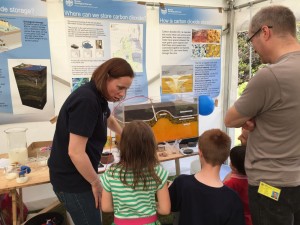This year we will have our own student reporter, Lindsey Higgins, from Stockholm University, at the EGU GA. Lindsey will be reporting on research presented in the ERE sessions on this blog and social media. Please let us know if you think you have a suitable session for Lindsey to attend and report on. Here is some more about Lindsey and her motivations!
****
Blog by Lindsey Higgins
As far back as I can remember, I have always felt drawn to the sciences. Fortunately, I had encouraging teachers when I was young and strong mentors throughout my university years. When choosing my degree program as an undergraduate, Physical Geography seemed like a perfect fit. It provided me with the opportunity to study a variety of topics and to really refine my research interests. At Buffalo State College in New York I chose a concentration of meteorology and climatology while also studying for a minor in Anthropology. This combination was the start of my interest in the intersection of human activity and environmental variability.
After taking part in any research project I could get myself into as an undergraduate, I felt the experience and drive necessary to further my academic career. At The Ohio State University I had the privilege of a research assistantship at the Byrd Polar Research Center in the Ice Core Climatology group. After working with a strictly climatological project for my Master’s degree, I was ready to move back into research that brought in the aspect of human involvement in the environment.
Currently, I am a PhD student at Stockholm University working with a crater lake in northern Tanzania. In my dissertation research, I use lake sediment to reconstruct past variability and remote sensing to look at modern fluctuations in the size of this lake. As this lake is an important freshwater resource for the people living around it, I became very interested in how it is affected by activities in the surrounding area and began collaborating with social scientists. If you are interested in this work, I will be presenting on Tuesday at 13.45 in room -2.47 during the session “Narrowing the gap: palaeoenvironment and human interaction during Late Quaternary” (CL1.06/GM6.9).
Aside from my research interests, I also find myself drawn to science communication and outreach. This is what led me to apply for a student reporter position at EGU. I often find myself asking how as researchers, we can translate our work to make it more understandable for the general public as well as people in positions to impact environmental policy development. It is my hope that after I complete my doctoral program, I can continue to be involved with this bridge between scientific research and public outreach.
I am grateful for this opportunity to report for the Energy, Resources and the Environment division and looking forward to sharing my experience at this year’s General Assembly!


